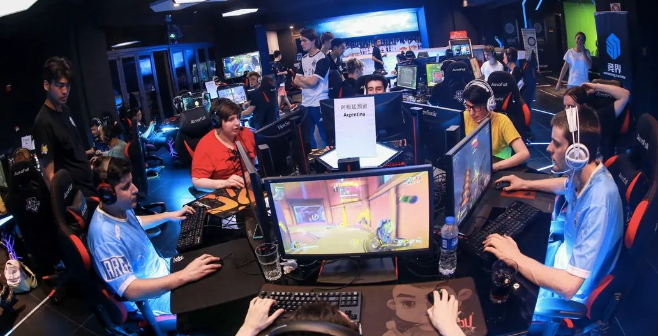Competitive online gaming has grown from a niche hobby into a global phenomenon, with millions of players and spectators worldwide. What started as casual competition among friends has evolved into a professional industry known as esports, where skilled players and teams compete in high-stakes tournaments. This article explores the rise of competitive online gaming, its transformation into a professional sport, and its impact on the BK8 community and beyond.
The Early Days of Competitive Gaming
The Beginnings of Online Competition
Competitive gaming has been around since the earliest days of video games, but the advent of online multiplayer gaming brought new dimensions to the scene. Early online games like “Quake” and “StarCraft” allowed players to compete against others globally, setting the stage for more organized competitions. The growth of broadband internet and gaming platforms further facilitated these competitions, making them more accessible to players everywhere.
The Emergence of LAN Parties and Tournaments
Before esports became a mainstream phenomenon, LAN (Local Area Network) parties were popular among gaming enthusiasts. These gatherings allowed players to connect their computers and compete in person, fostering a sense of community and friendly competition. The first official gaming tournaments, such as the Cyberathlete Professional League (CPL) founded in 1997, provided a more formal structure for competitive gaming.
The Evolution into Professional Esports
The Birth of Esports Leagues and Organizations
As competitive gaming grew in popularity, the need for structured leagues and organizations became apparent. Organizations like Major League Gaming (MLG) and Electronic Sports League (ESL) emerged, offering regular tournaments and structured competition. These organizations helped standardize rules, provide professional oversight, and secure sponsorship deals, making esports a more viable career path for players.
The Growth of Esports Spectatorship
One of the key factors in the rise of esports has been the growth of its audience. Streaming platforms like Twitch and YouTube have made it easy for fans to watch live competitions and interact with players. Esports events now attract millions of viewers, both online and in-person at venues like stadiums and convention centers. This growing spectatorship has attracted significant investment, further fueling the industry’s growth.
The Professional Esports Ecosystem
Esports Teams and Players
Professional esports teams operate similarly to traditional sports teams, with players, coaches, and support staff. Players often specialize in specific games or roles and undergo rigorous training to hone their skills. The most successful players and teams can earn substantial incomes from tournament winnings, sponsorships, and streaming revenue.
Sponsorships and Endorsements
Sponsorship deals play a crucial role in the esports ecosystem, providing financial support and resources for teams and events. Major brands from various industries, including technology, energy drinks, and apparel, have entered the esports market, recognizing its potential for reaching young and tech-savvy audiences. These partnerships help legitimize esports and provide players with opportunities beyond competition.
The Impact of Esports on the Gaming Community
Cultural Influence and Community Building
Esports has significantly influenced gaming culture, shaping how games are played, developed, and perceived. The competitive nature of esports has led to the emergence of gaming communities focused on skill improvement and competition. Additionally, the camaraderie and shared passion within these communities have helped reduce stigma around gaming and promote it as a legitimate form of entertainment.
Opportunities for Career Development
The growth of esports has created new career opportunities beyond just playing professionally. Roles such as coaches, analysts, commentators, and event organizers have become integral parts of the esports ecosystem. Furthermore, academic programs and scholarships dedicated to esports are emerging, providing educational pathways for those interested in pursuing careers in this field.
Challenges and Considerations in Esports
Player Welfare and Burnout
While bk8 ทางเข้า มือถือ offers lucrative opportunities, it also presents challenges, particularly concerning player welfare. The intense training schedules and high-pressure environments can lead to burnout and mental health issues. It’s crucial for organizations to prioritize the well-being of players, offering support systems and promoting a healthy work-life balance.
Maintaining Fair Play and Integrity
Like any competitive sport, esports faces issues related to fair play and integrity. Cheating, match-fixing, and doping are concerns that can undermine the legitimacy of competitions. Esports organizations and governing bodies must implement strict regulations and penalties to maintain the integrity of the sport and ensure a level playing field for all participants.
The Future of Esports
The Expansion of Esports Genres
While esports has traditionally been dominated by genres like first-person shooters (FPS), real-time strategy (RTS), and multiplayer online battle arenas (MOBAs), other genres are gaining traction. Games like battle royales, sports simulations, and fighting games are expanding the esports landscape, attracting new audiences and diversifying the competitive scene.
The Integration with Mainstream Media
Esports is increasingly intersecting with mainstream media and traditional sports. Major networks are broadcasting esports events, and collaborations between traditional sports teams and esports organizations are becoming more common. This integration helps bridge the gap between gaming and broader entertainment, bringing esports to a wider audience.
Conclusion
The rise of competitive online gaming and the professionalization of esports represent a significant cultural and economic shift in the entertainment landscape. From humble beginnings to a global industry, esports has transformed how people view and engage with video games. As the industry continues to grow and evolve, it will likely continue to shape the future of entertainment, offering exciting opportunities for players, fans, and stakeholders alike.

